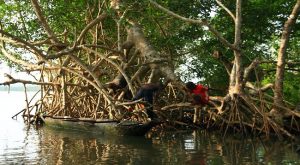Environmentalists have called for the protection of Nigeria’s mangroves ahead of the International Day for the Conservation of the Mangrove Ecosystem.

They made the call at a webinar organised by the Association for Environmental Impact Assessment of Nigeria (AEIAN) in collaboration with the Rivers Chapter of Fisheries Society of Nigeria (RivFISON) on Wednesday, July 26, 2023.
The International Day for the Conservation of the Mangrove Ecosystem is celebrated every year on July 26.
It aims to raise awareness of the importance of mangrove ecosystems as “a unique, special and vulnerable ecosystem” and to promote solutions for their sustainable management, conservation and uses.
This International Day was adopted by the General Conference of the UN Educational, Scientific and Cultural Organisation (UNESCO) in 2015.
Delivering his keynote speech, Dr Aroloye Numbere, a mangrove ecologist, while speaking on the topic: “Mangrove: Food Basket of the Sea and Haven of Fisheries,” said fishes get their food from the mangrove ecosystem.
Numbere said that the mangrove forest is found in the coastal area of the world where aquatic species inhabit the mangrove forests.
The don said that the mangrove vegetation was seriously being endangered by human activities leading to loss of biodiversity.
“Mangroves are one of the world’s most productive ecosystem. “They serve as the supermarket of the sea,” Numbere said.
According to him, mangroves render enormous ecosystem services including cooking, food, charcoal, medicinal herbs, fishery, forest products, restoration and tourist attraction and spiritual purposes.
Numbere stressed the need to preserve mangrove ecosystem because they are hotspots for biodiversity and melting point for species.
He said that the Niger Delta is a biodiversity haven housing a great number of species such as the grasscutter, rats squirrels, antelope, porcupine and over 200 species of fishes from 78 families.
He said that fishing limits laws and regulations need to be put in place for sustainable fishing.
The expert also mentioned other sustainable use of fisheries as: conserving the fish through outright ban on fishing for a while, use of fishing methods, outlawing fishing with poison and explosives.
Numbere listed causes of biodiversity extinction as habitat destruction, poaching, pollution, invasive species and oil and gas exploration.
On the other hand, he said that biodiversity could be protected through the formulation of laws and treatises, habitat preservation, protection (strict or limited protection).
He said that in embarking on construction projects, the government and individual developers should be able to balance development and preservation for the sake of future generation.
“There is the need to weigh the cost and benefits of a project.
“Are we weighing the long-term and short-term benefits of the project to know if the loss of biodiversity will be more than the benefits of the project?” Numbere asked.
He expressed his appreciation to the AEIAN and RivFISON for putting up the webinar to educate people on the need to conserve the mangrove ecosystem.
The webinar attracted experts and environmentalists from different fields.
Some of the attendees urged environmentalists and civil society organisations to rise up to the occasion by ensuring that proper environmental impact assessment was done on any project either by individuals or government to forestall the huge loss of biodiversity.
Citing the Rivers State Government’s proposed 50.15km Ring Road project, they wondered if accurate mapping of the route of the project was done to forestall huge loss of biodiversity.
They decried huge loss of mangrove in the Niger Delta area through oil and gas exploration, which they said had resulted in the loss of biodiversity.
By Fabian Ekeruche
